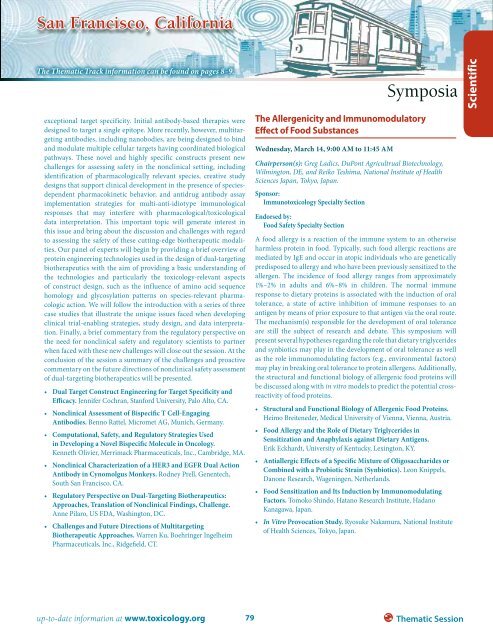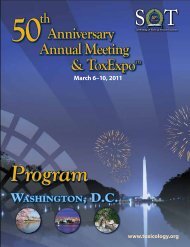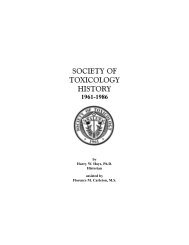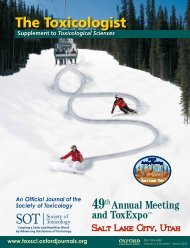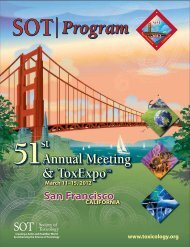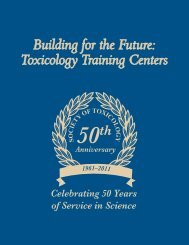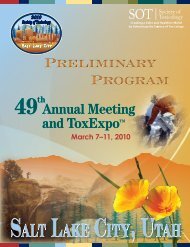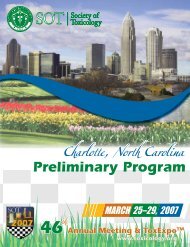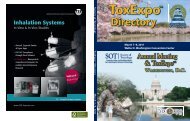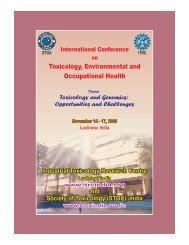51st Annual Meeting & ToxExpo - Society of Toxicology
51st Annual Meeting & ToxExpo - Society of Toxicology
51st Annual Meeting & ToxExpo - Society of Toxicology
Create successful ePaper yourself
Turn your PDF publications into a flip-book with our unique Google optimized e-Paper software.
San Francisco, California<br />
The Thematic Track information can be found on pages 8–9.<br />
exceptional target specificity. Initial antibody-based therapies were<br />
designed to target a single epitope. More recently, however, multitargeting<br />
antibodies, including nanobodies, are being designed to bind<br />
and modulate multiple cellular targets having coordinated biological<br />
pathways. These novel and highly specific constructs present new<br />
challenges for assessing safety in the nonclinical setting, including<br />
identification <strong>of</strong> pharmacologically relevant species, creative study<br />
designs that support clinical development in the presence <strong>of</strong> speciesdependent<br />
pharmacokinetic behavior, and antidrug antibody assay<br />
implementation strategies for multi-anti-idiotype immunological<br />
responses that may interfere with pharmacological/toxicological<br />
data interpretation. This important topic will generate interest in<br />
this issue and bring about the discussion and challenges with regard<br />
to assessing the safety <strong>of</strong> these cutting-edge biotherapeutic modalities.<br />
Our panel <strong>of</strong> experts will begin by providing a brief overview <strong>of</strong><br />
protein engineering technologies used in the design <strong>of</strong> dual-targeting<br />
biotherapeutics with the aim <strong>of</strong> providing a basic understanding <strong>of</strong><br />
the technologies and particularly the toxicology-relevant aspects<br />
<strong>of</strong> construct design, such as the influence <strong>of</strong> amino acid sequence<br />
homology and glycosylation patterns on species-relevant pharmacologic<br />
action. We will follow the introduction with a series <strong>of</strong> three<br />
case studies that illustrate the unique issues faced when developing<br />
clinical trial-enabling strategies, study design, and data interpretation.<br />
Finally, a brief commentary from the regulatory perspective on<br />
the need for nonclinical safety and regulatory scientists to partner<br />
when faced with these new challenges will close out the session. At the<br />
conclusion <strong>of</strong> the session a summary <strong>of</strong> the challenges and proactive<br />
commentary on the future directions <strong>of</strong> nonclinical safety assessment<br />
<strong>of</strong> dual-targeting biotherapeutics will be presented.<br />
• Dual Target Construct Engineering for Target Specificity and<br />
Efficacy. Jennifer Cochran, Stanford University, Palo Alto, CA.<br />
• Nonclinical Assessment <strong>of</strong> Bispecific T Cell-Engaging<br />
Antibodies. Benno Rattel, Micromet AG, Munich, Germany.<br />
• Computational, Safety, and Regulatory Strategies Used<br />
in Developing a Novel Bispecific Molecule in Oncology.<br />
Kenneth Olivier, Merrimack Pharmaceuticals, Inc., Cambridge, MA.<br />
• Nonclinical Characterization <strong>of</strong> a HER3 and EGFR Dual Action<br />
Antibody in Cynomolgus Monkeys. Rodney Prell, Genentech,<br />
South San Francisco, CA.<br />
• Regulatory Perspective on Dual-Targeting Biotherapeutics:<br />
Approaches, Translation <strong>of</strong> Nonclinical Findings, Challenge.<br />
Anne Pilaro, US FDA, Washington, DC.<br />
• Challenges and Future Directions <strong>of</strong> Multitargeting<br />
Biotherapeutic Approaches. Warren Ku, Boehringer Ingelheim<br />
Pharmaceuticals, Inc., Ridgefield, CT.<br />
Symposia<br />
The Allergenicity and Immunomodulatory<br />
Effect <strong>of</strong> Food Substances<br />
Wednesday, March 14, 9:00 AM to 11:45 AM<br />
Chairperson(s): Greg Ladics, DuPont Agricultrual Biotechnology,<br />
Wilmington, DE, and Reiko Teshima, National Institute <strong>of</strong> Health<br />
Sciences Japan, Tokyo, Japan.<br />
Sponsor:<br />
Immunotoxicology Specialty Section<br />
Endorsed by:<br />
Food Safety Specialty Section<br />
A food allergy is a reaction <strong>of</strong> the immune system to an otherwise<br />
harmless protein in food. Typically, such food allergic reactions are<br />
mediated by IgE and occur in atopic individuals who are genetically<br />
predisposed to allergy and who have been previously sensitized to the<br />
allergen. The incidence <strong>of</strong> food allergy ranges from approximately<br />
1%–2% in adults and 6%–8% in children. The normal immune<br />
response to dietary proteins is associated with the induction <strong>of</strong> oral<br />
tolerance, a state <strong>of</strong> active inhibition <strong>of</strong> immune responses to an<br />
antigen by means <strong>of</strong> prior exposure to that antigen via the oral route.<br />
The mechanism(s) responsible for the development <strong>of</strong> oral tolerance<br />
are still the subject <strong>of</strong> research and debate. This symposium will<br />
present several hypotheses regarding the role that dietary triglycerides<br />
and synbiotics may play in the development <strong>of</strong> oral tolerance as well<br />
as the role immunomodulating factors (e.g., environmental factors)<br />
may play in breaking oral tolerance to protein allergens. Additionally,<br />
the structural and functional biology <strong>of</strong> allergenic food proteins will<br />
be discussed along with in vitro models to predict the potential crossreactivity<br />
<strong>of</strong> food proteins.<br />
• Structural and Functional Biology <strong>of</strong> Allergenic Food Proteins.<br />
Heimo Breiteneder, Medical University <strong>of</strong> Vienna, Vienna, Austria.<br />
• Food Allergy and the Role <strong>of</strong> Dietary Triglycerides in<br />
Sensitization and Anaphylaxis against Dietary Antigens.<br />
Erik Eckhardt, University <strong>of</strong> Kentucky, Lexington, KY.<br />
• Antiallergic Effects <strong>of</strong> a Specific Mixture <strong>of</strong> Oligosaccharides or<br />
Combined with a Probiotic Strain (Synbiotics). Leon Knippels,<br />
Danone Research, Wageningen, Netherlands.<br />
• Food Sensitization and Its Induction by Immunomodulating<br />
Factors. Tomoko Shindo, Hatano Research Institute, Hadano<br />
Kanagawa, Japan.<br />
• In Vitro Provocation Study. Ryosuke Nakamura, National Institute<br />
<strong>of</strong> Health Sciences, Tokyo, Japan.<br />
Scientific<br />
up-to-date information at www.toxicology.org 79<br />
Thematic Session


